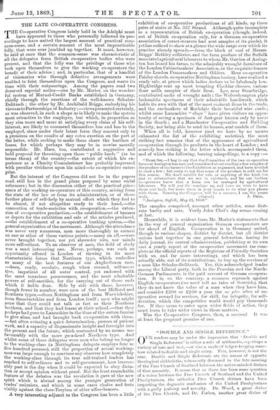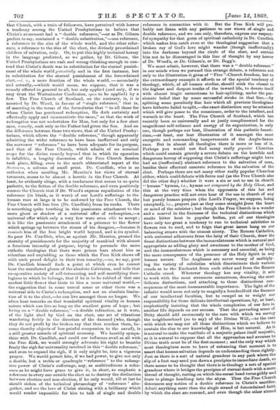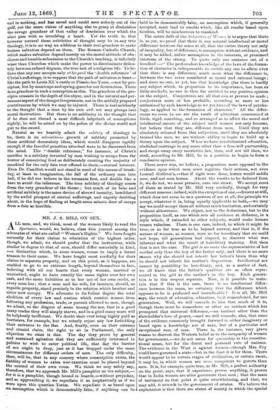"DOUBLE AND SINGLE REFERENCE."
OUR readers may be under the impression that Double and Single Reference' is either a rule of arithmetic,—perhaps variety of tare and tret, —or else a mode of ledger-keeping somehow related to double and single entry. This, however, is not the case. Double and Single Reference are the names of opposite theological shibboleths, vehemently discussed in the late meeting of the Free Church of Scotland between the active-minded divines of that assembly. It seems that as there has been some question of a union between the Free Church of Scotland and the United Presbyterians, the orthodox Free Church divines have been inspecting the dogmatic confession of the United Presbyterians with a godly jealousy and severity. Dr. Wood, a great divine of the Free Church, and Dr. Forbes, another great divine of that Church, with a train of followers, have perceived with horror a tendency among the United Presbyterians to believe that Christ's atonement had a " double reference,"—or as Dr. Gibson prefers to say, contained a " double substitution,"—one reference, a reference to the sins of the whole world, and the other reference, a reference to the sins of the elect, the divinely preordained children of salvation, only. Or, to put this highly technical heresy in the language preferred, as we gather, by Dr. Gibson, the United Presbyterians are rash and wrong-thinking enough to contend that Christ's death was in substitution for the eternal punishment of the whole world potentially and in the first instance, but in substitution for the eternal punishment of the foreordained elect,—i. e., a mere fraction of the whole w orld, — secondarily and actually,—which would mean, we suppose, that it was a remedy offered in general to all, but only applied (and only, if we may trust the Westminster Confession, open to be applied) by a few. The Free Church of Scotland, on the contrary, is, it is asserted by Dr. Wood, in favour of "single reference," that is, of asserting in the terms of the formularies that " to all those for whom Christ has purchased redemption, He doth certainly and effectually apply and communicate the same," so that the work of redemption was not undertaken for Man, but only for a few elect men, namely, such only as the Father had given the Son. And on the difference between these two views, that of the United Presbyterians, which allows the " double reference," though apparently admitting the wider reference to have been ineffectual and only the narrower " reference " to have been adequate for its purpose, and that of the Free Church, which admits of no nominal scope for the divine remedy beyond that in which its operation is infallible, a lengthy discussion of the Free Church Session took place, filling, even in the much abbreviated report of the Scotsman, a column of small print. Dr. Candlish, who is so orthodox when assailing Mr. Maurice's lax views of eternal torments, ,seems to be almost a heretic in the Free Church. At least, he evidently clings, with a tenderness that seems to us quite pathetic, to the fiction of the double reference, and even positively assures the Church that if Dr. Wood's express repudiation of the reference (in blank, as it were) of our Lord's sufferings to the human race at large is to be endorsed by the Free Church, the Free Church will lose him (Dr. Candlish) from its ranks. There is something quite touching in this passionate attachment to the mere ghost or shadow of a universal offer of redemption,—a universal offer which only a very few were even able to accept ; it is like the passionate attachment of a prisoner to the flower which springs up between the stones of his dungeon,—because it reminds him of the free bright world beyond, and is its symbol. So poor Dr. Candlish, who, as against Mr. Maurice, pressed the eternity of punishments for the majority of mankind with almost a ferocious intensity of purpose, trying to persuade the more catholic theologian that there were prison bars about him as relentless and unyielding as those which the Free Kirk shows off with such proud delight in their iron tenacity,—so, we say, poor Dr. Candlish himself finds a point at which even he cannot bear the unrelieved gloom of the absolute Calvinism, and tells that co-operative society of self-tormenting and self-mortifying theologians to which he belongs, that if he is to be robbed of that one modest little flower that hints to him a more universal world,— the suggestion that in some unreal sense or other there was a universal side to Christ's redemption, and not an absolute limitation of it to the elect,—he can live amongst them no longer. We often hear remarks on that wonderful spiritual vitality in human nature which can live so long on the smallest germ of hope ; but living on a " double reference,"—a double refraction, as it were, of the light shed by God on the elect, one set of vibrations wandering feebly in the direction of the damned (who, though they do not profit by the broken ray that thus reaches them, become thereby objects of less painful compassion to the saved), is a still greater miracle of spiritual economy. We heartily sympathize with Dr. Candlish, and could our influence avail at all with the Free Kirk, we would strongly advocate his right to breathe freely the sigh for universality involved in this " double reference," and even to expand the sigh, if it only might be, into a vigorous prayer. We would permit him, if we had power, to give not only a double, but a treble or quadruple " reference to the redemptive power of Christ's sufferings, nay, as multitudinous a reference as he might have grace to give it, in short, so emphatic a reference to every one outside the elect as to destroy the distinction between election and non-election, if he only would, till at last he should sicken of the technical phraseology of ' reference ' altogether, and see the love of Christ shining with a brilliancy which would render impossible for him to talk of single and double
reference in connection with it. Bat the Free Kirk will probably not listen with any patience to our views of .single and double reference, and we can only, therefore, express our respectful sympathy for that germ of spiritual catholicity in,Dr. Candlish which makes him catch even at the theological suggestion that a broken ray of God's love might wander (though ineffectually) into the darkness beyond the circle of the elect, and entreat him not to be discouraged in this line of thought by any horror of Dr. Wood's, or Dr. Gibson's, or Dr. Begg's.
We must admit, however, that there was a " double reference" in our minds when we perused this strange debate, a reference not only to the illustration it,gives of "Free "-Church freedom, but to the extraordinary example it affords us of the special tendency of theology, which, of all human studies, should stick the closest to the highest and deepest truths of the inward life, to devote itself with almost tragic earnestness to hair-splitting, under the passionate belief that by some successful stroke in that line,—by splitting some peculiarly fine hair which all previous theologians have hitherto failed to split,—the exact distinction may be attained which will give peace to the conscience, order to the intellect, and warmth to the heart. The Free Church of Scotland, which has recently been so universally and so justly complimented for the magnificent self-reliance and energy of its organization, is only one, though perhaps our best, illustration of this pathetic fanaticism,—at least, our best illustration of it amongst the most energetic and commanding temperaments of the Anglo-Saxon race. But in almost all theologies there is more or leas of it. Perhaps you would not find many really popular Churches which could sustain gravely a severe debate on the horrible and dangerous heresy of supposing that Christ's sufferings might have had an (ineffectual) abstract reference to the salvation of man, besides their effectual concrete reference to the salvation of the elect. Perhaps there are not many other really popular Churches either, which could debate with fierce zeal (as the Free Church also did the other day) whether it were a sin or not to use in church " human" hymns, i.e., hymns not composed by the Holy Ghost, and this at the very time when the opponents of this lax and dangerous practice will not even hear of the use in church of any but purely human prayers (the Lord's Prayer, we suppose, being excepted), i.e., prayers just as they come straight from the heart or mind of the minister ; but though the Free Church is a wonder and a marvel in the fineness of the technical distinctions which excite bitter heat in popular bodies, yet all our theologies have only too great a tendency to run to technical subtleties as flowers run to seed, and to feign that great issues hang on our balancing straws with the utmost nicety. The Roman Catholics, with universal adherence from the laity of their Church, draw the finest distinctions between the immaculateness which is natural and appropriate as adding glory and sweetness to the mother of God, and the immaculateness which is necessary and essential, as being the mere consequence of the presence of the Holy Spirit in any human nature. The Anglicans are never weary of multiplying the variety of subtleties which discriminate their various creeds as to the Eucharist from each other and from the Roman Catholic creed. IV herever theology has any vitality, it sets to work with the most strenuous earnestness, drawing the most delicate distinctions, and attaching to those distinctions consequences of the most immeasurable importance. The light of the infinite would seem not only to magnify a hundredfold the fineness of our intellectual faculties, but to compel us to weight our responsibility for those delicate intellectual operations, by, at least, emphatically insisting that the whole complexion of our fate in another life depends on our success. That the pervading sense of Deity should add enormously to the care with which we survey the neighbourhood (so to say) of the Divine Will,—to the care with which we map out all those distinctions which we believe to contain the clue to our knowledge of Him, is but natural. As it is natural to make the vestibule of a majestic palace itself majestic, so it is natural to suppose that all the approaches and avenues to Divine truth must be of the first moment ; and the only way which most theologians seem to have of enhancing that moment is to assert that human salvation depends on understanding them rightly. Just as there is a sort of natural grandeur in any path where the slip of a foot may send you down a precipice to immediate death, so there seems to be thought that there is in theology a sort of special grandeur where it bridges the precipice of eternal death with a mere thread of thought, resting on which the surest head turns giddy and fears to plunge headlong into the abyss. Thus the Free Church denounces any notion of a double reference in Christ's sacrifice. Admit anything more than the single strand of foreordained faith by which the elect are rescued, and:even though the other strand
end in nothing, and has saved and could save nobody out of the gulf, yet the mere vision of anything else to grasp at diminishes the savage grandeur of that valley of desolation over which the elect pass with so trembling a heart. Yet the truth is, that however natural these subtleties of thought may be in any true theology, it is in no way an addition to their real grandeur to make human salvation depend ou them. The Roman Catholic Church, which makes salvation depend merely on the moral attitude of obedience and humble submission to the Church's teaching, is infinitely wiser than Churches which make the power to discriminate delicately between refined dogmas, the true test of a religious life. To believe that any one accepts only at his peril the' double reference' of Christ's sufferings, is to suppose that the path of salvation is beset— like the path to Louis XI.'s castle at Plessis-les-Tours, —not by precipices, but by mantraps and spring-guns for our destruction. There is no grandeur in such a conception as this. The grandeur of the precipice conaiats in the depth of the abyss, and in the natural and permanentaspect of the danger itrepresents, not in the artfully prepared contrivances by which we may be injured. There is real sublimity in the thought that a man by his own evil act may plunge into moral destruction. But there is no sublimity in the thought that if he does not thread a most difficult labyrinth of conceptions rightly, he will be seized on by the police of the divine world and put to the sword.
Natural as we heartily admit the subtlety of theology to be, there is an adventitious .growth of subtlety promoted by these artificial damnatory ideas, which would disappear rapidly enough if the fanciful penalties attached were to be dismissed from the mind. The "double reference," for instance, of Christ's sacrifice is a subtlety invented by men wishing to escape from the horror of conceiving God as deliberately creating the majority of mankind for the only fate ever offered to them,—eternal torment. Even Dr. Candlish would not stand in need of this means of breaking, at least in imagination, the fall of the ordinary man into hell, if he did not believe in the torments first, and double like a hare to avoid the inference. The true subtlety of theology comes from the very grandeur of the theme ; but much of its false and artificial subtlety is the mere device of shrewd insanity, bewildered by the awful prospect of eternal sufferings, and eagerly doubling about, in the hope.of finding at length some minute door of escape from a fate so horrible.
































 Previous page
Previous page